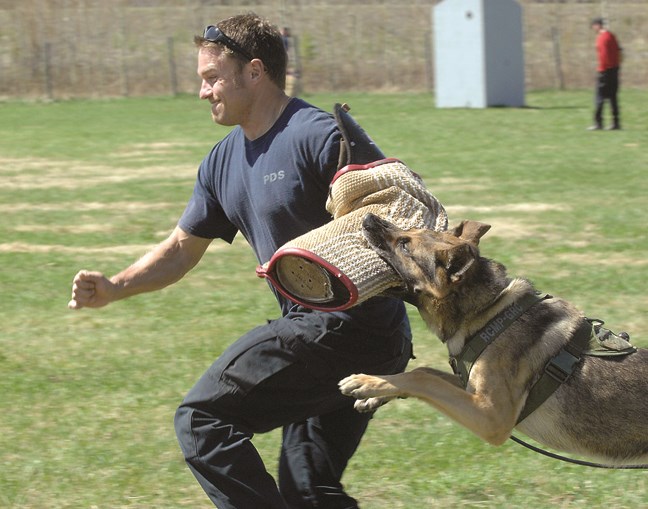If you want to become a dog handler for the RCMP, be prepared to pay your dues.
Cst. Kyle Sharpe was among those doing just that when he put on heavy arm protection and became the practice dummy for some German Shepherds with a strong desire to pursue bad guys.
Sharpe and about 30 other RCMP officers from across Western Canada who've either become full-fledge handlers or are working to become one were gathered at a field off Ellis Road near Prince George Airport to put the canines and themselves through the paces.
As a relative newcomer to that particular field of policing, Sharpe was one of the "quarry" dogs like Astro and Baron were chasing down as they and their handlers honed their techniques. He'll have at least five and as much as eight years to go of learning and training himself before he becomes a dog handler himself.
After three-and-a-half years of exploring various avenues of policing, Sharpe settled on dog handling a few months ago in part because he grew up with dogs but also because he has seen how helpful they can be in tracking down criminals.
So far, he has not regretted the decision.
"It's fantastic, it's a lot of fun," Sharpe said.
Becoming a dog handler is not for everyone, said Prince George RCMP Sgt. Collin Warwick, who has been in the program for 13 years.
"It takes a lot of dedication from these guys," said Warwick, who added plenty of hours outside of work are devoted to learning the ropes. Understudies will also work as "imprinters" who raise the dogs from about eight weeks old to 18 months, when the canines themselves are ready for training.
On occasion, the RCMP's use of dogs has come under fire. While dogs in the Mounties and most other police forces in B.C. are trained to use the "contact apprehension" method, some use a different style referred to as "minimum force - handler control," also known as "bark and hold."
While RCMP are sticking to the traditional method, Warwick said there have been changes in terms of the types of situations where the dogs will be deployed.
"If we know it's a minor offence and there is certain information that will negate the need for a dog, then we're not deploying," Warwick.
He maintained that contact apprehension is the safest for the handlers, the dogs and, for that matter, the public and stressed the amount of training RCMP go through before becoming handlers.
"It's a lot of high risk things that we're doing, it's high profile things and typically things of high importance," Warwick said. "Oftentimes we're often kind of the last line or way things are going to get resolved, so we have to make sure our dogs are of high quality and highly trained but also that the members are trained as well."

.png;w=120;h=80;mode=crop)

